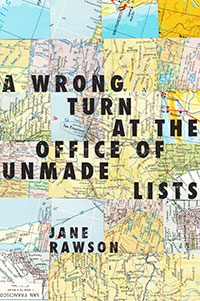
A Wrong Turn at the Office of Unmade Lists / Jane Rawson (Transit Lounge, 2013)
Wrong Turn is set on the streets of a semi-post-apocalyptic Melbourne in 2030. Climate change has displaced many and made life difficult for those eking out an existence under the glare of the sun in a world with little water and many ways to die. The main character is Caddy, a thirty-three year old aspiring writer who does what she can (including casual prostitution) to eat and drink. The early chapters of her wheeling and dealing in errands and squabbles over five dollars as she sits in a hot bar sparring with the bartender reminded me of the feel of Thomas Disch’s 334 and some of Philip K. Dick’s work (besides the mindbending which everyone focuses on, PKD was a chronicler of the little person surviving the future). Rawson has brought to life the underclass of the near future, with its mix of boredom and menace.
To do this as successfully as she has would have been plenty enough to accomplish in a novel, but Rawson attempts much, much more. Without losing its tethering in this ruined Melbourne, the focus begins to turn to the characters Caddy is writing about, two orphaned teenagers attempting to travel through every twenty-five foot square of the USA, a task that will take them ninety years at their current pace. (I love a quixotic project like this; there is a whole other novel worthy of Paul Auster or George Perec here.) Without giving away too many of the twists, the novel shifts into the territory of writer-meets-characters and the Gap, a meta-realm which could have come from a Stephen King novel. For my taste, it’s territory which has already been overexplored, but Rawson’s take on it is quite fresh.
Wrong Turn is a distinctly Australian novel, compelling as a portrait of life as climate change hits and of the petty concerns, dreams, losses and consolations that make up the fabric of existence, as through the eyes of Caddy, a winsome character. The author blogs here; you can read her reflections on the writing life, including her work-in-progress, a non-fiction guide to surviving climate change.












